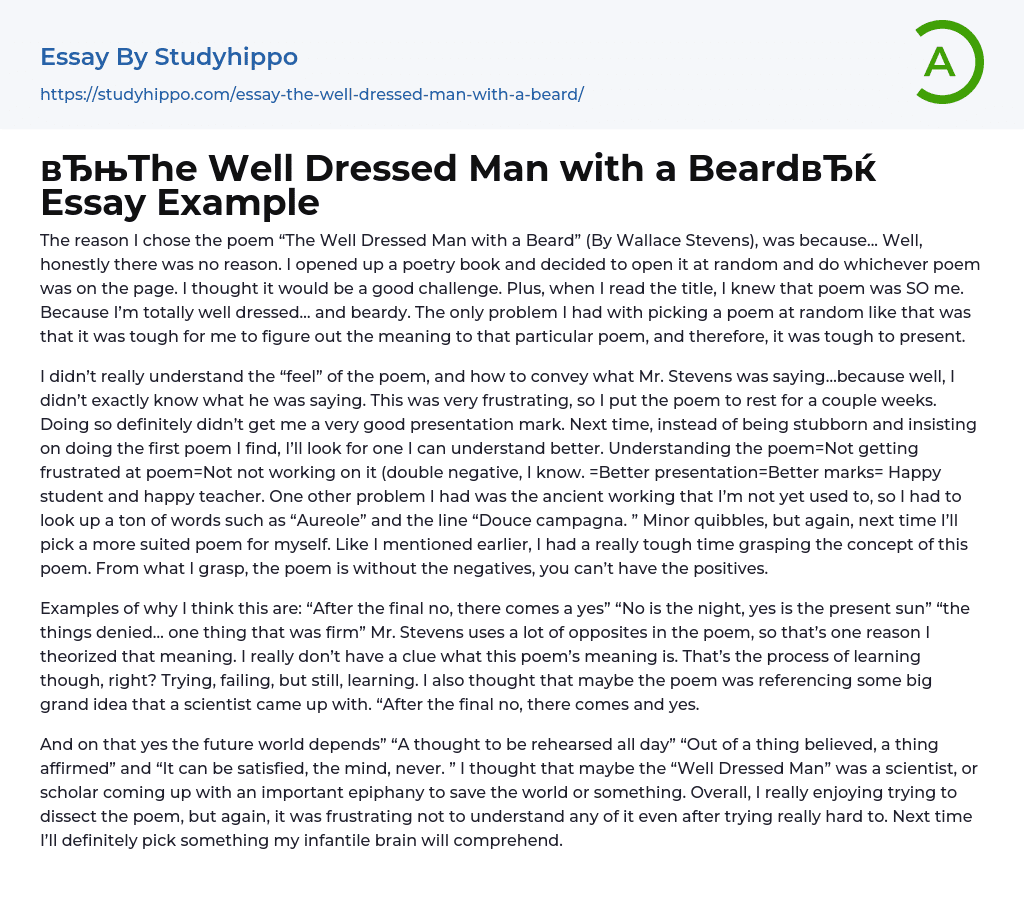The reason I chose the poem “The Well Dressed Man with a Beard” (By Wallace Stevens), was because... Well, honestly there was no reason. I opened up a poetry book and decided to open it at random and do whichever poem was on the page. I thought it would be a good challenge. Plus, when I read the title, I knew that poem was SO me. Because I’m totally well dressed… and beardy. The only problem I had with picking a poem at random like that was that it was tough for me to figure out the meaning to that particular poem, and therefore, it was tough to present.
I didn’t really understand the “feel” of the poem, and how to convey what Mr. Stevens was saying…because well, I didn’t exactly know what he
...was saying. This was very frustrating, so I put the poem to rest for a couple weeks. Doing so definitely didn’t get me a very good presentation mark. Next time, instead of being stubborn and insisting on doing the first poem I find, I’ll look for one I can understand better. Understanding the poem=Not getting frustrated at poem=Not not working on it (double negative, I know. =Better presentation=Better marks= Happy student and happy teacher. One other problem I had was the ancient working that I’m not yet used to, so I had to look up a ton of words such as “Aureole” and the line “Douce campagna. ” Minor quibbles, but again, next time I’ll pick a more suited poem for myself. Like I mentioned earlier, I had a really tough time grasping the concept of this poem.
From what I grasp, the poem is without the negatives, you can’t have the positives.
Examples of why I think this are: “After the final no, there comes a yes” “No is the night, yes is the present sun” “the things denied… one thing that was firm” Mr. Stevens uses a lot of opposites in the poem, so that’s one reason I theorized that meaning. I really don’t have a clue what this poem’s meaning is. That’s the process of learning though, right? Trying, failing, but still, learning. I also thought that maybe the poem was referencing some big grand idea that a scientist came up with. “After the final no, there comes and yes.
And on that yes the future world depends” “A thought to be rehearsed all day” “Out of a thing believed, a thing affirmed” and “It can be satisfied, the mind, never. ” I thought that maybe the “Well Dressed Man” was a scientist, or scholar coming up with an important epiphany to save the world or something. Overall, I really enjoying trying to dissect the poem, but again, it was frustrating not to understand any of it even after trying really hard to. Next time I’ll definitely pick something my infantile brain will comprehend.
- Age Of Enlightenment essays
- Ethos essays
- Time essays
- Acceptance essays
- Meaning Of Life essays
- Reality essays
- Natural Law essays
- Political Philosophy essays
- Utilitarianism essays
- Existence essays
- Free Will essays
- Good And Evil essays
- Confucianism essays
- Relativism essays
- Conscience essays
- Environmentalism essays
- Empiricism essays
- Epistemology essays
- Ethics essays
- Existentialism essays
- Human Nature essays
- Individualism essays
- Metaphysics essays
- Philosophy Of Life essays
- Transcendentalism essays
- Truth essays
- Destiny essays
- Determinism essays
- Fate essays
- Functionalism essays
- Philosophers essays
- Pragmatism essays
- Future essays
- Child Observation essays
- Critical Reflection essays
- Teaching Philosophy essays
- Personal Philosophy essays
- Action Speak Louder Than Words essays
- Can Money Buy Happiness essays
- Values of Life essays
- Ethical dilemma essays
- Normative Ethics essays
- Virtue Ethics essays
- Belief essays
- Deontology essays
- Moral essays
- Virtue essays
- Work Ethic essays
- Henry David Thoreau essays
- Carl Jung essays




